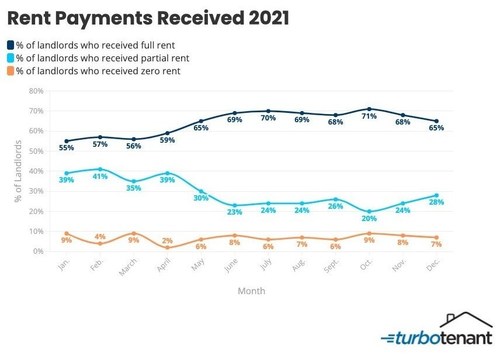TurboTenant publishes its annual report analyzing rental industry trends collected from survey data.
Fort Collins, CO – Jan. 13, 2022 (PRNewswire) TurboTenant, an all-in-one, free property management tool, released its annual analysis of rental industry trends – the State of the Rental Industry Report 2021. Utilizing both landlord and renter survey data collected throughout 2021, the report examines trends related to rent payments, evictions, rent relief and more.
“TurboTenant’s State of the Rental Industry Report provides a deep dive into the impact the pandemic continues to have on the rental industry,” said Seamus Nally, TurboTenant’s CEO. “It is evident in our survey data that independent landlords and renters continue to face challenges related to rent relief, eviction moratoriums and a competitive real estate market.”
Read the State of the Rental Industry Report 2021.
The State of the Rental Industry Report 2021 Key Findings
Many renters still struggled to pay rent last year despite positive job growth and increased vaccine ability in the U.S. The issue was exacerbated by the slow rollout of rent relief. Here are a few key findings:

- For every month of 2021, landlords with 1-4 units received the most full rent payments and the most missed rent payments.
- In December, 17% of landlords said they had filed for eviction due to nonpayment of rent – the highest percentage yet.
- Since April of 2021, over 50% of renters reported monthly they were unaware of federal or state emergency rental assistance programs.
“Through our product and education, we strive to respond in real-time to the challenges landlords and renters are facing,” Nally said. “Free rent reporting and the ability to collect partial rent payments online were direct responses to such challenges. We hope the data in this report provides helpful insights for the broader rental industry as it has for us.”
Please reach out to press@turbotenant.com for specific data requests. For city-specific rental trends, visit the Rental Data Center.
About TurboTenant
More than 400,000 independent landlords across the U.S. turn to TurboTenant for free, all-in-one online property management solutions. Features offered by TurboTenant include rental applications, tenant screening, property marketing, rent payments, lease agreements and rent reporting. Sign up for free at www.turbotenant.com.
Contact
Taylor Marley
TurboTenant
taylor@turbotenant.com
SOURCE TurboTenant, Inc.



